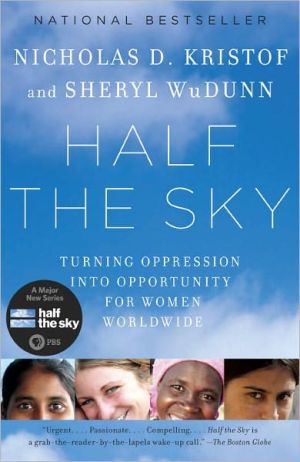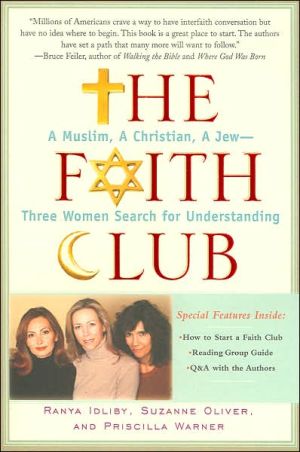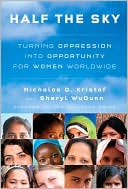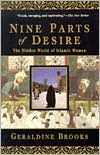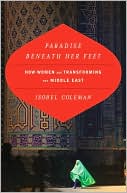Death of Feminism: What's Next in the Struggle for Women's Freedom
Feminist icon and political activist Phyllis Chesler, author of the 2.5-million copy bestseller Women and Madness and the controversial The New Anti-Semitism, calls for an overhaul of the women's movement. In this important book, Phyllis Chesler asks the questions: Within feminism, is there room for free thinkers who oppose the party line? What if a feminist believes in capitalism? God? Patriotism? Chesler is the first to show the crisis in feminism today, which is silencing women and...
Search in google:
Feminist icon and political activist Phyllis Chesler (author of the 2.5-million copy bestseller Women and Madness and the controversial The New Anti-Semitism) calls for an overhaul of the women's movement Publishers Weekly Chesler, an active member of the women's movement for four decades, makes a serious charge against her sisters: she feels they have abandoned their commitment to freedom and feminist values, and "become cowardly herd animals and grim totalitarian thinkers." Chesler (Women and Madness) takes liberal feminists to task for not speaking out against what she sees as the most important threat to Western freedom: Islamic terrorism. She has penned a cross between a cri de coeur and a deeply rhetorical polemic that makes scores of provocative points, but because of sometimes offhanded scholarship (e.g., listing unsourced news items as research), a proclivity for overgeneralizing and an anecdotal approach to arguing, will probably fail to win over readers who don't already agree with her. Her sense of urgency leads her to paint, with broad strokes, a frightening portrait of current U.S. academic and political culture: the campuses, she says, have "bred a new and diabolical McCarthyism" spearheaded by leftists and approvingly quotes a feminist scholar saying that "women's studies has become... the most retrograde of disciplines" because of its single-minded reliance on postmodern theory. As in her last book, The New Anti-Semitism, Chesler raises important issues, but her style will alienate the very people she means to reach. (Nov. 5) Copyright 2005 Reed Business Information.
The Death of Feminism\ What's Next in the Struggle for Women's Freedom \ \ By Phyllis Chesler \ Palgrave Macmillan\ Copyright © 2005 Phyllis Chesler\ All right reserved.\ ISBN: 1-4039-6898-5 \ \ \ Chapter One\ The "Good" Feminist \ In the fall of 2004, I found myself in conversation with a woman who in no way wished to offend or argue with me. Indeed, she assumed we stood on common ground (she is a feminist professor) and thus became increasingly agitated by my silence as she recited the usual litany: President Bush is the terrorist, not bin Laden, the war in Iraq is worse than Vietnam, America's reputation is ruined, we need to work in concert with the United Nations, and so on. I said nothing. Finally she blurted out: "But after what we did in Guatemala and all our other dirty doings in South America, you can't say that we didn't deserve having it thrown back at us on 9/11. You do understand that America deserves being hated everywhere. Don't you?"\ The reality is, I don't. So I responded: "What justice means to those both living and dead in Guatemala and elsewhere is no doubt a burning issue. But you can't possibly believe that al-Qaeda's terrorism is a form of retributive justice, can you?"\ Ah, but she can and does. I tell this story to illustrate a very important point: She is not a bad person, she is being a "good feminist."\ And she is not alone. Thiskind of thinking is the first article of faith among "good" people, not only in Manhattan, where I live, but among their counterparts everywhere else. Decent, educated, progressive people-the kind who donate their still-new clothing to a shelter for battered women, recycle carefully, volunteer in a soup kitchen on holidays, worry about the whales, the seals, the redwood forests, the disappearing infant girls in India, the ravaging injustices of capitalism, and what happened to the American Indians (and I am not being sarcastic about any of these concerns)-are by now so desperate for a solution to such problems, for an end to greed, for "equality now" (formerly known as "revolution now" or "paradise now") that they have lost their ability, to think independently about causes and their meaning.\ The good people who have in the past condemned American foreign and corporate politics are now ready to die for America's sins; they are quite willing to sacrifice their own way of life, as well as their very lives, for a noble cause: They are ready to surrender to a cleansing, redeeming force-if it will only finally rid the world of its immense suffering. They believe they have caused the world's pain and can therefore cure it. They view themselves as barbarians who have forfeited their right to challenge any other group, culture, religious practice, or idea-no matter how dangerous or inane.\ Some of these good people may actually believe that the humbling of America and the destruction of Israel will reduce the suffering of the world's victims. They hope it will also free them from the burden of empire-guilt they so unhappily bear-even if this also means that the whole planet might be bombed back to the seventh century.\ My friends, the good people, in some ways view al Qaeda as a force that is trying to level the playing field.\ I, on the other hand, think al Qaeda is only an annihilating force that has nothing to do with justice but instead represents a totalitarian war against western ideals such as freedom and democracy; we are in the cross-hairs of the Islamist desire to rule the world. I view Osama bin Laden and the late Yasser Arafat and their minions of mullahs as radically evil, not as noble representatives of their own people-people whom they themselves have tortured, tyrannized, and impoverished. I don't view them as extreme but with good intentions.\ Saying things like this, coupled with my spirited defense of Israel, has gotten me into trouble with nearly every politically correct good person I know and has resulted in my being severely ignored or criticized in the liberal, left, secular, and feminist media and led to my being perceived as a right-wing, conservative, reactionary turncoat.\ The way I see it: Everything is at stake, it is all up for grabs, this is no time for nihilistic rhetoric or tedious party lines. This is not the time to think in ways calculated to please or to least offend one's peers. My goal is quite the opposite. I do not want to offend my good feminist friends; on the contrary, I would like to bring women and men together-from both the right and the left-in order to make a real difference. This is a time when we, the good people, have to think clearly, creatively, boldly, and morally.\ * * *\ Back in the day, I was once considered a good person myself. But I often held the minority position among feminists on most issues and was never a true-blue Marxist-Leninist. My kind did not prevail in the academy or in the media. Today what young people and outsiders may think feminism is really about is not the feminism that many of us once fought for.\ In 2002, many feminists congratulated me on my book, Woman's Inhumanity to Woman, in which I documented female-female aggression and competition and the ways in which women, like men, have internalized sexist beliefs. Mainstream feminist leaders were far less sanguine about my topic and maintained a grudgingly respectful distance. But I was genuinely surprised by how the air grew still around me when first I began to speak out as an American patriot. Vicious attacks alternated with major silences. My Zionism put me in another category. This time, when feminists called to compliment me on my bravery, they spoke in damnable whispers.\ For example, a former president of a state National Organization of Women (NOW) chapter called to say: "Everything you're saying is so true. Jew-hatred and Israel-bashing is at its worst among the feminists we know. Especially if they're Jewish. I've begun losing friends over this issue. I don't want this to happen, nor do my friends, so they've begun to not talk about Israel when I'm around. Truthfully, I don't bring it up myself anymore."\ I am not exaggerating; she whispered the entire time we were on the phone.\ Another colleague said I was "right on," that "Zionism is the dirtiest word imaginable" among our old crowd of feminists. She privately congratulated me for my clarity and courage but sotto voce. She whispered: "I don't tell anyone what I really think. Why should I? Life is short. Life is sweet. I'm not about to risk all my friendship networks that cushion me from loneliness."\ Two dear friends, both longtime feminists, came to offer blessed support. After much conversation, one of them said, almost in wonder, "So, you see the Jews as the symbol for western civilization. What happens to them is what will happen to the rest of us if we don't wake up. And you see America more as a bright and shining promise to the rest of the world, not as a purveyor of death. What a genuinely radical idea!"\ In the last five years, I have observed some fairly strange behavior in public places on the part of the good people. Ordinary civilians better understand that the terrorists mean to kill us and that appeasement is not an option. The good people do not. (Or as Harvard professor and author Michael Ignatieff said, "Both Paul Berman and I share an impatience with liberals who don't yet understand what ruthless enemies we are up against.")\ For example, early in 2003, in the midst of a quiet cafe dinner, a soft-spoken artist friend suddenly began screaming, "I hate President Bush, I hope he dies of cancer." Her face got red, and she screwed up her eyes. I was taken aback. Her rage was extreme and out of context; we had not been discussing politics or al Qaeda's ongoing war against the infidels. How could anyone be so angry or so irrational about a political figure?\ I can understand marshaling arguments, point by point, against a particular political policy. I can understand criticizing any public figure as long as it is done in a reasonable, rational way. But in an era of competitive reality shows (one step removed from the Christians versus the lions), tolerant, reasoned discourse has lost its cachet.\ In the fall of 2000, two things happened: Arab Muslim jihadists launched their second (or third or fourth) intifada against Israel, and the U.S. Supreme Court declared that George W. Bush had won the presidential election. Immediately thereafter, a "coarse partisanship" (the phrase is Mark Helprin's in the Wall Street Journal) permeated nearly every interaction in America, reduced what should have been thoughtful and civilized conversation into vulgar, gladiatorial combat. The enlightened good people-the artists, academics, journalists, scholars, and activists-saw conspiracies everywhere and threatened to depart these shores for those of Europe if the Republicans won the presidency in 2004. Good feminist people insisted that Europe was more receptive to the practice of feminism, now aka anti-Americanism.\ For example, one American feminist professor proudly admitted to me that she could no longer "bear" to listen to the American media, that NPR and WBAI could no longer be "trusted," and that to maintain the best "critiques of America," one had to listen to the British and French media. She told all her students to do likewise. She begged me to do so too.\ A retired American feminist professor and activist said she was going to move to Italy because she could already hear the sounds of "concentration camp construction" in her San Francisco neighborhood. In my view, this woman lacked moral gravity and all common sense-for which, of course, she was duly lionized by her friends who described her as prescient, prophetic, a force for good in the universe.\ I once thought that liberals, progressives, Democrats, leftists, peace activists, academics, feminists, and gay liberationists not only tolerated diversity but verily embraced the concept with passion and principle. Either I was wrong or lately such good people have changed radically. Thus, it is no longer possible to have a civil conversation in America or in Europe, at least not among the good people and not if you don't toe the party line.\ I may be overstating this, but it seems that many of the 49 percenters-those who voted for John Kerry-refuse to engage in conversation with anyone who does not agree with them totally and about everything. Thus, one cannot be pro-choice and anti-gay marriage, nor can one oppose both rape and affirmative action. One has to sign on to the entire politically correct agenda or risk being attacked and ostracized.\ Many progressives have so circled their wagons that even if you come in peace and are known to agree with much of their agenda, they will still regard you as a traitor if you are not sufficiently anti-American or do not strongly support the Palestinian cause. God forbid if you say that a religion (other than Judaism) is not purely peaceful, or that a culture (other than America's) may be dreadfully misguided. If you say this, the good people will instantly conclude that you are a racist.\ The good people are not afraid to speak their truths; indeed, they are shouting them from the world's rooftops. Those who disagree with them, even in minor ways, have grown quieter and perhaps more determined to oppose them. Americans on both sides of this great divide are increasingly reluctant to say what they really think unless they are safely among co-true believers. No one wants to risk the inevitable screaming match or ruptured relationship.\ This is a dangerous moment in our history.\ For example, a lifelong Democrat and pioneering feminist physician tells me that her grown grandchildren won't talk to her because she voted for President Bush. "My family is deeply divided over this." A judge begs me to advise him. The problem? His thirty-year-old son has become "corrupted by identity politics" and insists on wearing a pro-PLO T-shirt and an Arab kaffiyeh when he comes home for Jewish holidays. "When my wife asked him to come but please, without the political fashion statement, he hung up on her. Now, he won't take our calls."\ A Republican politician from the Midwest tells me that he can no longer discuss politics at his family table because his brother views his party as "Satanic." "Out of respect for my mother, I keep quiet. Otherwise we'd come to blows." A West Coast gay playwright tells me that he dares not reveal that he is a patriotic American and that he is anti-jihad. "They'd cut me off at the knees. It's hanging time on the left, and I want to live." A lifelong feminist Democrat in New York tells me that she will no longer talk politics with anyone who did not vote against Bush. "I don't know what world they live in, but it's not mine."\ Does she believe that engaging in dialogue with the designated "enemy" somehow constitutes traitorous behavior? If so, and I suspect this is the case, I must ask: Is she only afraid of the Republicans-who have not abolished her First Amendment right to speak out as a feminist and who have not rescinded the Fourth Amendment against improper search and seizure-or is she afraid of the media and academic elite who view civil conversation with anyone who opposes them as a high crime?\ It is crucial to note that our government has not criminalized free speech nor have dissidents been jailed for saying whatever they please. In my opinion, the chilling of free speech has been unilaterally imposed by those who claim to act on its behalf.\ What sort of group or person refuses to recognize the existence of and refuses even to talk to, no less hire, someone with whom they disagree? What sort of group or person persistently slanders and demonizes those with whom they happen to disagree on key political issues? What sort of group or person demands uniform party-line thinking-and is powerful enough to coerce people into "hiding" their potentially dissident views, sometimes even from themselves?\ Surely I must be talking about the power of the former Soviet state or Nazi Germany, Maoist China, or any one of the many Islamic dictatorships; or I must be describing Republican and conservative thinking. Alas, I am not.\ Today totalitarian thinking is also flourishing among media and academic elites. Oddly enough, such totalitarian thinking and its consequent thought control are flying high under the banners of "free speech" and "political correctness." Dare to question these elites' right to silence or shame those who are trying to expose or challenge them, and you'll quickly be attacked as representing a new and more dreadful form of "McCarthyism" and "witch-hunting."\ For example, on March 6, 2005, the Columbia University chapter of Scholars for Peace in the Middle East, and the David Project co-sponsored a daylong academic conference at Columbia to challenge the Palestinianization of the Middle East Asian Language and Culture Department and the professorial intimidation of pro-Israel students. I spoke at this conference and can assure you that the other speakers were dignified, serious, and knowledgeable. Nevertheless, on April 4, under the umbrella of "Stop McCarthyism at Columbia," many speakers condemned the Jewish students' efforts to foster free discovery and eliminate intimidation from the classroom; one called their campaign a "rightwing onslaught" led by "a small number of Zionist students." Dr. Charles Jacobs, the director of the David Project, explains the situation in this way:\ The modern university is severely challenged by radical relativism. Can anyone distinguish between propaganda, lies, and teaching? ... How then would a university president stop a professor from teaching lies and hate? The conventional theory, expressed by the New York ACLU [American Civil Liberties Union] in this debate, is that universities are inherently protected ... because they are "open marketplaces of ideas" in which truth will out. But everyone knows that Middle East studies departments are more like captured regions in a war of ideas, which have become fortresses of entrenched power, almost entirely closed off to scholars who do not subscribe to the Palestinianist viewpoint.... It is easier to avoid these tough issues and instead throw stones at those who wish to safeguard some standard of truth and decency of discourse. The newest stone thrown at us, ironically by those who wish to silence our opinions, is "McCarthyism!" Yet we have never said anyone should be fired or prevented from getting a job in Middle East studies because of his or her views-or silenced so that his or her words could not be spoken in Columbia's halls. It is they who have done this.\ (Continues...)\ \ \ \ \ Excerpted from The Death of Feminism by Phyllis Chesler Copyright © 2005 by Phyllis Chesler . Excerpted by permission.\ All rights reserved. No part of this excerpt may be reproduced or reprinted without permission in writing from the publisher.\ Excerpts are provided by Dial-A-Book Inc. solely for the personal use of visitors to this web site. \ \
1The "good" feminist212Women and the crisis of independent thinking393The new intolerance554My Afghan captivity795The one-sided feminist academy1016In their own words : portraits of Arab, Muslim, and Middle Eastern women1317Islamic gender apartheid in the West1518Toward a new feminism183
\ From Barnes & NoblePhyllis Chesler's credentials as a feminist are impeccable: Her breakthrough Women and Madness has remained in print since 1972 and is still regarded as "the single most important work on women and mental 'health' and 'illness.' " Her elite status underlines the urgency of The Death of Feminism. In this wake-up call, Chesler argues that the women's movement has been overtaken by narrow-minded radicals who demand uniformity. To be a member of the club, you must reject capitalism; condemn religion as a form of patriarchy; oppose the war in Iraq; and turn a blind eye to oppressive practices in other societies. This is an insider's critique that no one can ignore.\ \ \ \ \ Publishers WeeklyChesler, an active member of the women's movement for four decades, makes a serious charge against her sisters: she feels they have abandoned their commitment to freedom and feminist values, and "become cowardly herd animals and grim totalitarian thinkers." Chesler (Women and Madness) takes liberal feminists to task for not speaking out against what she sees as the most important threat to Western freedom: Islamic terrorism. She has penned a cross between a cri de coeur and a deeply rhetorical polemic that makes scores of provocative points, but because of sometimes offhanded scholarship (e.g., listing unsourced news items as research), a proclivity for overgeneralizing and an anecdotal approach to arguing, will probably fail to win over readers who don't already agree with her. Her sense of urgency leads her to paint, with broad strokes, a frightening portrait of current U.S. academic and political culture: the campuses, she says, have "bred a new and diabolical McCarthyism" spearheaded by leftists and approvingly quotes a feminist scholar saying that "women's studies has become... the most retrograde of disciplines" because of its single-minded reliance on postmodern theory. As in her last book, The New Anti-Semitism, Chesler raises important issues, but her style will alienate the very people she means to reach. (Nov. 5) Copyright 2005 Reed Business Information.\ \ \ Library JournalChesler (The New Anti-Semitism) has produced an angry polemic calling American feminists to reexamine their priorities. In her view, feminism has become a victim of a natural female desire for affiliation at the expense of disagreement. The feminist clique in which she used to claim membership has now withdrawn, she writes, into "rigid intolerance of difference" represented by leftism and anti-Americanism. She makes this point mainly in regard to her concern that Islamism is such a great threat to women's rights, if not all freedom, that opposing it should be the primary task of all feminists. In the midst of this resentful diatribe, in which she singles out some activists personally for having snubbed or attacked her, Chesler adds a poignant chapter describing her 1960s captivity by her own in-laws as a young bride in Afghanistan. This juxtaposition indirectly provides an explanation for the vehemence of her opposition to exploitation of women in Muslim societies. For larger public libraries and academic libraries that collect contemporary opinion.-Lisa Klopfer, Eastern Michigan Univ., Ypsilanti Copyright 2005 Reed Business Information.\ \

